News
Barclays earned $1.7bn from company tied to Indigenous land invasion

Financial powerhouses including Barclays, Vanguard and BlackRock made millions from financing Brazilian meatpacker JBS, whose operations are driving destruction of Apyterewa Indigenous land
A PARAKANÃ BOY STANDS OVER A CHARRED SNAKE CARCASS, IN PARÁ STATE, BRAZIL. CÍCERO PEDROSA NETO / GLOBAL WITNESS
British bank Barclays earned $1.7 billion from financing Brazilian meat giant JBS over the last five years as the company’s operations contributed to the invasion and destruction of an Indigenous territory in Brazil, an investigation led by climate organisation Global Witness can reveal.
Barclays emerged as the largest creditor to JBS’s global operations, with the highest income generated from loans and underwriting fees among over 30 other financiers identified by independent research group Profundo.
JBS’s role in illegal deforestation
Commercial cattle ranching by non-Indigenous people is illegal in Indigenous territories designated under Brazil’s federal law.
However, between 2018 and 2023 nearly 8,000 cows raised within the Apyterewa Indigenous territory entered JBS’s supply chain, according to an analysis from the Center for Climate Crime Analysis (CCCA).
JBS did not reply to our request to comment.
The Apyterewa territory, home of the Parakanã people, in northern Brazil’s Pará state has seen more deforestation than any other Indigenous territory in recent years in the Brazilian Amazon.
Despite legal protections, cattle ranchers persistently invade these lands, exploiting the global appetite for beef and disregarding the rights of Indigenous communities.
In October 2023, the Brazilian government evicted these land invaders, but a recent flyover by Global Witness revealed active fires, indicating that both deforestation and invasions are still ongoing.
As the Amazon rainforest faces the worst fire season in two decades amid a severe drought, the destruction of Apyterewa is intensifying. This is because fires in the Amazon are largely triggered by human activity, especially by those clearing forests for land grabs.
Data from Brazil’s National Institute for Space Research (INPE) has confirmed more than 300 fire alerts since the start of this year, underscoring the persistent threat.
The environmental and human cost
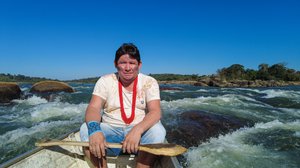
MAMA PARAKANÃ, CHIEF OF APYTEREWA INDIGENOUS VILLAGE AND A LEADER FIGHTING INVASIONS IN APYTEREWA, IN PARÁ STATE, BRAZIL. CÍCERO PEDROSA NETO / GLOBAL WITNESS
They destroyed everything. All we have left is grass. Our animals burned to death- Mama Parakanã, chief (cacique) of Apyterewa Indigenous Village
In Apyterewa, environmental destruction walks hand in hand with violence. A Parakanã chief described how his village was burned down in a land grabbers’ attack, while another community member recounted being shot at by a trespasser.
“The meat from the Apyterewa Indigenous land is meat from our territory,” said Mama Parakanã, chief (cacique) of Apyterewa Indigenous Village. “They destroyed everything. All we have left is grass. Our animals burned to death.”
Financial institutions’ oversight failure
Our investigation exposes significant failures within both the beef industry and the international financial sector. The former struggles with monitoring supply chains, while the latter often neglects measures to mitigate the environmental and social impacts of their investments.
“These findings lay bare how a seemingly routine deal made in New York or London can be linked to the preventable but devastating invasion of Indigenous lands,” said Alexandria Reid, Global Witness’ Campaign Strategy Lead.
“There is no world in which we manage to halt biodiversity loss and climate change without governments taking action to stop deforestation, which is best achieved by empowering Indigenous peoples to enforce their sovereignty and land rights,” she added.
There is no world in which we manage to halt biodiversity loss and climate change without governments taking action to stop deforestation- Alexandria Reid, Global Witness’ Campaign Strategy Lead
Barclays denied it has provided financing to JBS’s Brazil operations since 2021, adding that its policies were “updated in April 2023 to include restrictions on beef production and primary processing in high deforestation-risk countries in South America.”
The bank, however, did not comment on its financing of the company’s global operations, for “confidentiality reasons.”
For further details of company responses to these allegations, please see the investigation’s PDF.
Despite adopting stricter financing rules for deforesting companies last year, Barclays’s ties to JBS persist, as a loophole in the bank’s policy allows it to continue finance the company’s subsidiaries, including in the US.
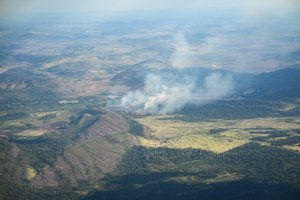
SMOKE FROM FIRES IN APYTEREWA INDIGENOUS TERRITORY, IN PARÁ STATE, BRAZIL, JULY 2024. CÍCERO PEDROSA NETO / GLOBAL WITNESS
Global demand for beef and the land rights crisis
The global demand for beef has driven widespread tropical deforestation, particularly in Brazil. Most of the forest clearance for cattle pasture is illegal, as ranchers encroach upon protected land that includes national parks and Indigenous territories.
A 2023 study in the journal Nature reported that deforestation within Amazonian Indigenous territories had increased by 129% since 2013.
The Apyterewa Indigenous land is at the centre of a crisis.
Under the stewardship of former President Jair Bolsonaro, between 2019 and 2022, both deforestation rates and threats to the community’s safety and traditional livelihoods spiked.
According to Brazilian government estimates, around 2,500 Indigenous people are distributed across 51 villages in the territory – primarily from the Parakanã, Mebengôkre Kayapó and Xikrim communities.
Meanwhile, Indigenous groups assert that when the invasion peaked, there were approximately 10,000 non-Indigenous people occupying the land.
The Parakanã people say the outsiders are polluting their water sources, depleting forest resources and threatening their traditional way of life.
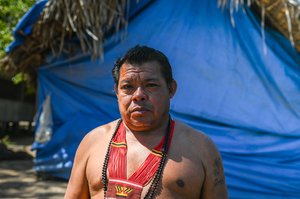
TATUARO PARAKANÃ, CHIEF OF THE CAETÉ VILLAGE AND LEADER FIGHTING THE INVASIONS IN APYTEREWA, SAYS HE HAS FACED DEATH THREATS FROM LAND GRABBERS. CÍCERO PEDROSA NETO / GLOBAL WITNESS
Where we hunted, where we collected nuts … the land grabbers knocked it all down- Tatuaro Parakanã, chief of Caeté village
Tatuaro Parakanã, chief of Caeté village, recounted the devastation caused by land clearances:
“Where we hunted, where we collected nuts … the land grabbers knocked it all down,” he said, citing persistent death threats.
Last year, he had to relocate with several families for safety, only to find his home reduced to ashes later. “All we want is going back home,” he added.
While the presence of cattle-ranching invaders has long been apparent, the ultimate – and sometimes indirect – buyers of their cows remained hidden in this complex supply chain, until now.
The indirect supply chain blind spot
This new CCCA analysis reveals that between 2018 and 2023, 7,795 cows slaughtered by Brazilian meatpacker JBS came from supply chains that include farms located in Apyterewa.
Of these, the CCCA calculates that 561 were sourced by JBS directly from illegal farms within the Apyterewa territory – while the majority, 7,234 cows, were part of JBS’s indirect supply chain.
CCCA identified these supply chain transactions using an algorithm that incorporates a multi-level analysis of information extracted from cattle transfer records documenting trade between relevant businesses owned by or transacting with JBS.
These cattle were likely “laundered” into the meatpacker’s supply chain, with ranchers transferring cattle from farms within the Indigenous territory to seemingly “clean” ranches with no recent forest loss or connection to the original land grab.
https://datawrapper.dwcdn.net/bM49n/8
Indirect supply chains represent a significant blind spot in tackling deforestation. A recent study by non-profit Mighty Earth showed that, between 2017 and 2022, indirect suppliers reportedly accounted for most deforestation linked to major meatpackers.
The new CCCA analysis revealed that two other meat industry heavyweights – Marfrig and Minerva – also sourced cattle from Apyterewa land.
According to this investigation, Marfrig received 94 cows directly from illegal farms and was linked to a further 2,691 cows through its indirect supply chain, while Minerva was associated with 277 Apyterewa-raised cows.
Both denied they purchased cows from properties located inside Indigenous lands.
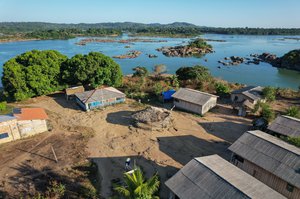
A PARAKANÃ VILLAGE IN APYTEREWA INDIGENOUS LAND, PARÁ, BRAZIL. CÍCERO PEDROSA NETO / GLOBAL WITNESS
Marfrig added that it monitors all its direct suppliers and 87% of its indirect suppliers in the Amazon.
Minerva said that it had no direct dealings with any of the farms which overlap with Apterewa indigenous territory, which was 88.6km away from the 300km marketing radius of Minerva’s Araguaina slaughter facility.
However, Minerva also noted that the data provided by Global Witness was not sufficient to conduct a “more detailed assessment of the provided indirect sales.”
For further details of company responses to these allegations, please see the investigation’s PDF.
During the five-year period of the analysis, CCCA found that in addition to the Big Three meatpackers, 37 other meatpackers had connections to Apyterewa land.
In total, 14,217 cows raised on illegal farms in Apyterewa territory appear to have reached these slaughterhouses.
All big meatpackers mentioned – JBS, Marfrig and Minerva – signed a legally binding agreement with Brazil’s federal prosecutors in 2009 to stop buying cattle from farms involved in illegal deforestation or located in protected areas or Indigenous territories.
These companies benefit from buying meat from an illegal source, which makes it cheaper- Leonardo Godoy, CCCA’s Brazil Program Acting Director
In 2022, JBS pledged to monitor the origin of all its suppliers’ cattle from the Amazon and Cerrado by 2025. For the rest of the world, the company said its supply chains will not be fully monitored until 2030.
The findings point to a two-tier systemic issue that harms those at the frontlines of the fight against deforestation in the Amazon, points out Leonardo Godoy, CCCA’s Brazil Program Acting Director:
“These companies [JBS, Marfrig and Minerva] benefit from buying meat from an illegal source, which makes it cheaper.”
In addition, there are financial giants simply failing to “impose effective regulatory measures to ensure they do not invest in companies that threaten the environment and human rights, [and that] profit extensively from the loans made to these companies.”
Profits over planet
The global beef trade is a lucrative business. According to the Forests & Finance coalitionof NGOs, banks financed agribusiness and forestry companies driving tropical deforestation with more than $260 billion between 2018 and 2023.
JBS, the largest buyer of Apyterewa cows, had numerous Western financial backers.
Global Witness and research group Profundo analysed investment and credit ties between JBS and its financiers during the Apyterewa land invasions.
The Profundo analysis of data obtained from Refinitiv Eikon and Bloomberg revealed that financial institutions, including Barclays, the Royal Bank of Canada, Rabobank and Santander, collectively generated billions of dollars in income from loans and underwriting services to JBS’s global operations in those years.
Although its direct financing of JBS’s Brazilian operations specifically appears to have been more limited in the analysed period, Barclays has long been the company’s biggest international financier across all JBS’s operations, continuing its support even when other banks distanced themselves from the controversial meatpacker.
Our findings add to more than a decade of allegations against JBS, whose links to environmental destruction and human rights abuses via its supply chains have been well-documented.
The company recently removed its reference to a “zero tolerance to … invasion of protected areas such as indigenous lands or environmental conservation areas” in its latest application to list its shares on the New York Stock Exchange.
https://datawrapper.dwcdn.net/uSgd6/7
The Profundo analysis also examined direct investment and shareholdings, indicating that US-based financial institutions pocketed a combined $660 million from JBS investments globally.
Asset management giants Vanguard, BlackRock, Fidelity Investments and Capital Group held the bulk of it, with Vanguard and BlackRock earning $46 million each from JBS’s Brazilian operations.
None of these US-based financial institutions commented on the allegations.
Separately, Global Witness has reported that BlackRock and Vanguard are among six firms holding over $11 million in active bonds issued by JBS and its subsidiaries through funds labelled as “environmental, social and governance” (ESG).
While these funds explicitly exclude fossil fuel companies from their portfolio, they do not outright exclude companies linked to deforestation in their screening process.
Global Witness contacted all the financial institutions mentioned in this report. Relevant extracts of the responses received are available in the investigation’s PDF.
Mama Parakanã told Global Witness: “I want to send a message to the banks because we suffered great losses. It was a lot of investment. Sometimes, they didn’t even know it was indigenous land. So, I’m telling them how they are to be blamed. The meat that came out of here, all our land here, and meat, all illegal.”
Invaders still present
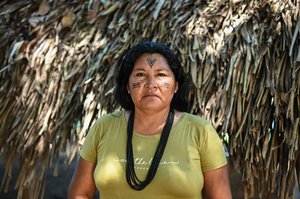
KOXAWEWOXA PARAKANÃ, VICE-PRESIDENT OF TATO’A INDIGENOUS ASSOCIATION AND A PARAKANÃ LEADER FIGHTING THE INVASIONS IN APYTEREWA, POSES FOR A PORTRAIT. CÍCERO PEDROSA NETO / GLOBAL WITNESS
White people are selling meat to the whole world, but it is our land that they are destroying- Koxawewoxa Parakanã, vice-president of Tato’a Indigenous Association and a Parakanã leader
Despite the Brazilian government’s claim of concluding evictions in October last year, non-Indigenous invaders remain on the Apyterewa territory, community members told Global Witness.
“White people are selling meat to the whole world, but it is our land that they are destroying. We want them to give back that money that they’ve made,” said Koxawewoxa Parakanã, vice-president of Tato’a Indigenous Association and a Parakanã leader.
Continued risks in the supply chain
The ongoing presence of invaders raises questions about how beef from Apyterewa may still enter major meatpackers’ supply chains today, despite their claims of sustainable practices.
This risk highlights the need for financiers, such as Barclays, Blackrock and others, to ensure their investments do not contribute to deforestation or land invasions, points out Global Witness’ Reid.
In that context, she added, governments also need to step up and ensure that banks are required to carry out checks before they finance companies operating in sectors we know are regularly connected to human rights abuses, land grabs and deforestation.
“The financial sector has no excuse to turn a blind eye to their role in funding companies driving deforestation.”
Original link: https://www.globalwitness.org/en/campaigns/forests/barclays-earned-17bn-company-tied-indigenous-land-invasion/